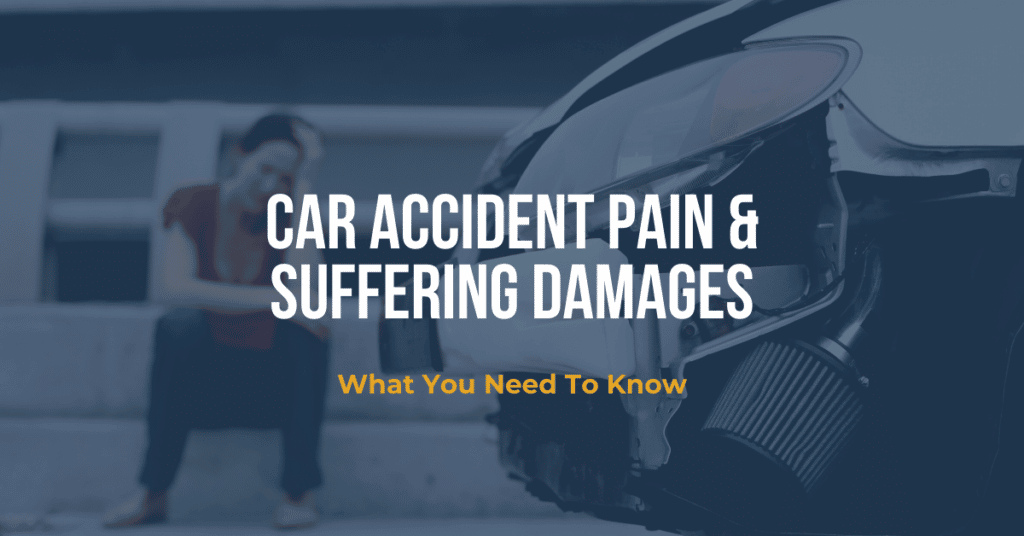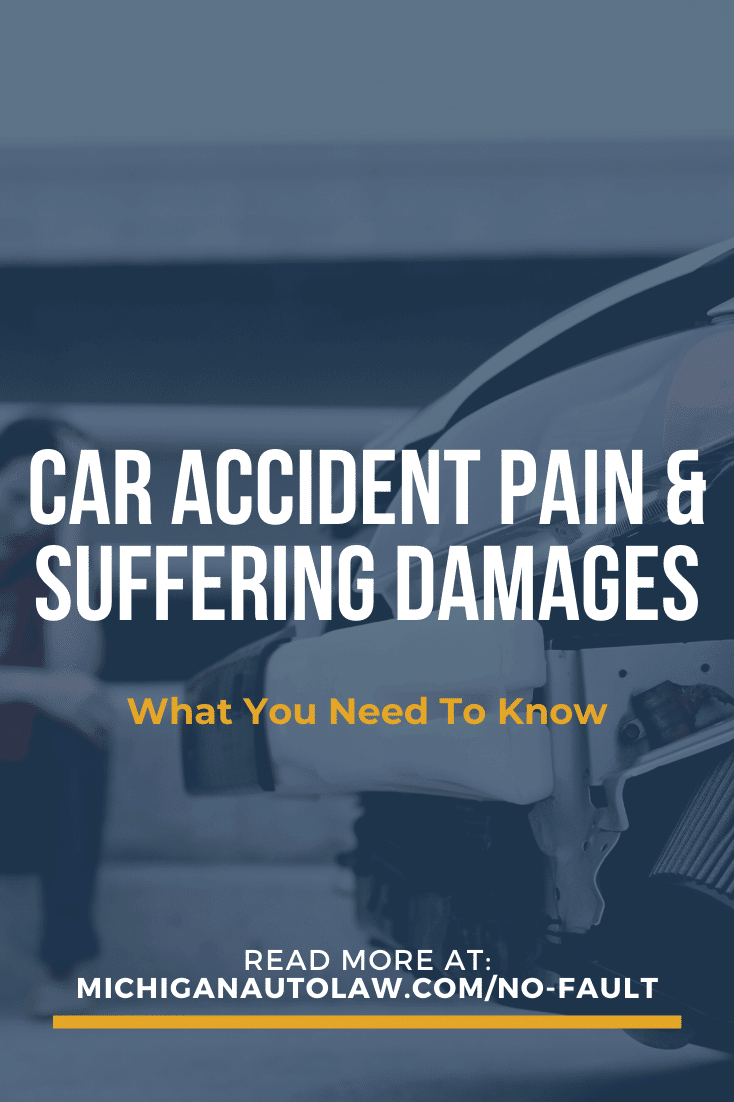Pain and Suffering Car Accident Damages In Michigan: Who Pays?

In Michigan, pain and suffering damages after a car accident can be recovered under certain circumstances by people who have been injured in a crash. They are intended to compensate victims for the pain and suffering they have suffered as a result of a motor vehicle crash caused by an at-fault driver’s negligence.
Unlike many other states, Michigan requires that crash victims show they have suffered a “serious impairment of body function” before they can recover these damages (which are also referred to as “noneconomic loss” damages). This requirement is called the Michigan bodily injury threshold or Michigan tort threshold law.
Can you get pain and suffering damages after a car accident in Michigan?
In Michigan, you can get pain and suffering damages from a car accident. These are damages that a victim can recover from an at-fault driver and/or his or her auto insurance company. Referred to as “noneconomic loss,” they will compensate a victim for physical pain, suffering and anguish.
What is considered pain and suffering in a car accident in Michigan?
According to Michigan law, the following conditions are considered pain and suffering damages in a car accident: (1) physical pain and suffering; (2) mental anguish; (3) fright and shock; (4) denial of social pleasure and enjoyments; (5) embarrassment, humiliation or mortification; and (6) shame, mental pain and anxiety.
How to prove it?
To prove these damages in Michigan, you must show that: (1) the driver who caused the crash was negligent; (2) he or she was 50% or more at-fault; (3) the driver’s negligence caused your injuries; (4) you suffered a “serious impairment of body function“; and (5) you experienced pain and suffering.
To learn more about proving pain and suffering from a car accident, please check out our pages on “Negligence: What You Must Prove In A Car Accident Case.”
What is Michigan bodily injury threshold?
The Michigan bodily injury threshold – or tort threshold law – is the legal standard that a victim must meet in order to sue the negligent, at-fault driver for pain and suffering damages. To satisfy the bodily injury threshold, a victim must have suffered a “serious impairment of body function.”
To prove that he or she has a “serious impairment of body function” as a result of injuries sustained in the crash, they must show:
- An impairment that is “objectively manifested,” “meaning it is observable or perceivable from actual symptoms or conditions by someone other than the injured person.” (MCL 500.3135(5)(a))
- An objectively manifested “impairment of an important body function, which is a body function of great value, significance, or consequence to the injured person.” (MCL 500.3135(5)(b))
- The objectively manifested impairment of an important body function “affects the injured person’s general ability to lead his or her normal life, meaning it has had an influence on some of the person’s capacity to live in his or her normal manner of living. Although temporal considerations may be relevant, there is no temporal requirement for how long an impairment must last. This examination is inherently fact and circumstance specific to each injured person, must be conducted on a case-by-case basis, and requires comparison of the injured person’s life before and after the incident.” (MCL 500.3135(5)(c))
Who pays for pain and suffering damages in a car accident in Michigan?
In Michigan, generally, the at-fault driver’s auto insurance company pays for pain and suffering damages after a car accident. However, if these damages exceed the limit in the at-fault driver’s bodily injury liability insurance policy, then the at-fault driver may have to pay out of his or her own personal assets.
How to calculate these damages
There is no set formula for how to calculate these damages after a crash. It depends on the facts of each case. Factors include a person’s injuries, impairments and how a person’s general ability to lead his or her normal life has been affected. There is no monetary cap on these damages.
To calculate your pain and suffering damages after a car accident, please check out our “Settlement Calculator.”
How to determine these damages
There is no specific equation to determine these damages from a crash. The compensation that is awarded for a victim’s damages will depend on the evidence in that specific victim’s case. Damages are intended to compensate the victim, not punish the at-fault driver.
Pain and suffering compensation after a car accident in Michigan
There is no legal maximum under the law as to how much money you can recover for pain and suffering compensation after a car accident in Michigan. The only limiting factors are what a jury or judge will award or what the insurance company will agree to settle for depending on the at-fault driver’s policy limits.
Average pain and suffering settlement for a car accident in Michigan
There is no public data showing the average pain and suffering settlement for a car accident in Michigan. The amount of your settlement will depend on the facts of your case. An important factor is the at-fault driver’s policy limits. Michigan law requires drivers to carry $250,000 in liability insurance.
How to sue for pain and suffering damages after a car accident in Michigan?
In Michigan, you have three years from the date of your car accident to file a negligence lawsuit against the at-fault driver to sue for pain and suffering damages. The at-fault driver must be 50% or more at-fault. To recover these damages, you must show you suffered a “serious impairment of body function.”
Injured in an automobile crash in Michigan? Call Michigan Auto Law now!
If you were injured in an automobile crash in Michigan, call now (855) 781-7747 for a free consultation with one of our experienced lawyers. There is no cost or obligation. You can also visit our contact page or use the chat feature on our website.
Michigan Auto Law is Michigan’s largest and most successful law firm that specializes exclusively in helping people who have been injured in auto accidents.
Our secret? Our auto accident lawyers deliberately handle fewer cases than other personal injury law firms. This allows us to focus more time and attention on our cases.
Unlike other law firms, our auto accident attorneys are never too busy to promptly return phone calls and answer questions.
We have more than 2,000 5-Star Reviews that reflect this care and attention to detail.
More importantly, this client-focused approach leads to better and faster settlements for our clients. Michigan Auto Law has recovered more million-dollar settlements and trial verdicts for motor vehicle accidents than any other lawyer or law firm in Michigan. We’ve also recovered the highest ever reported truck accident and car accident settlement in the state.
Call now so we can start making a real difference for you.






